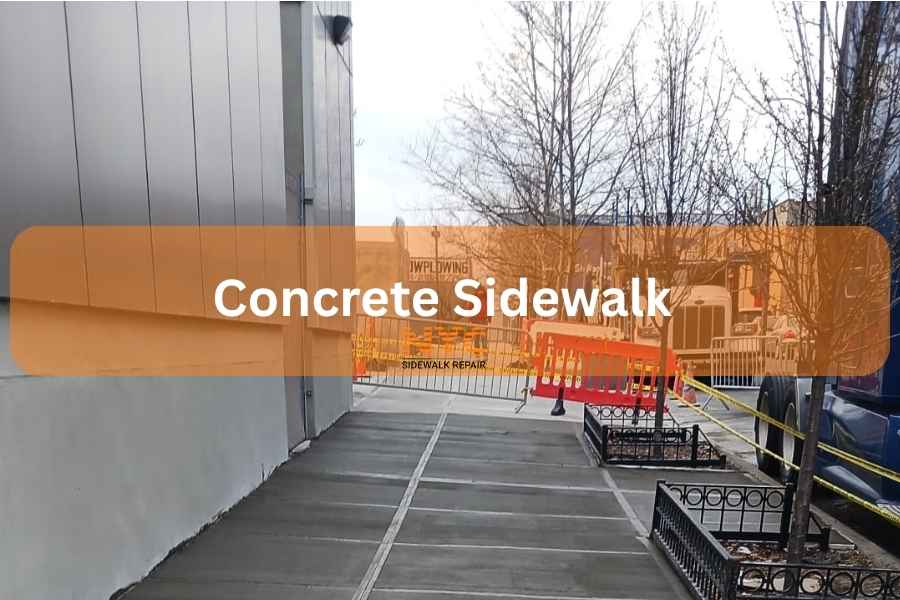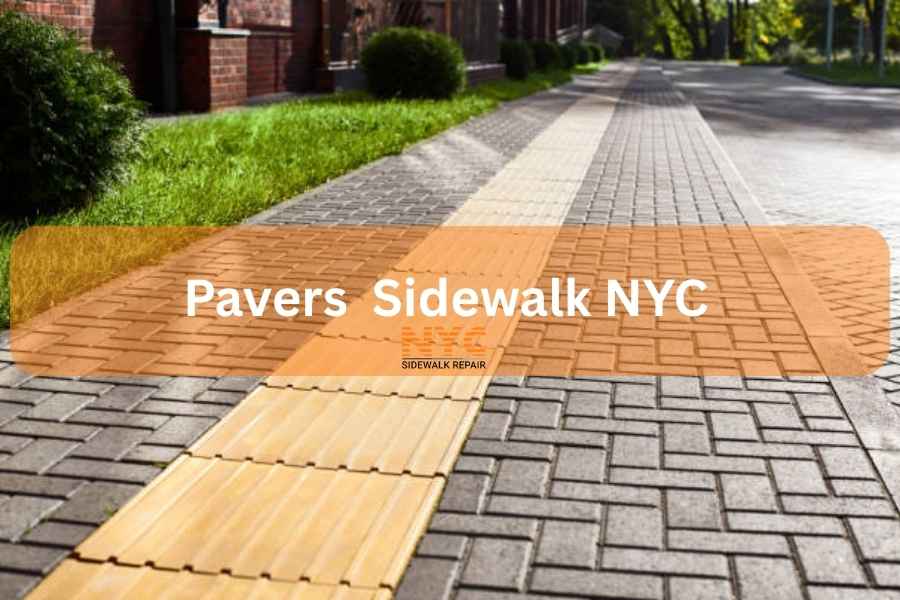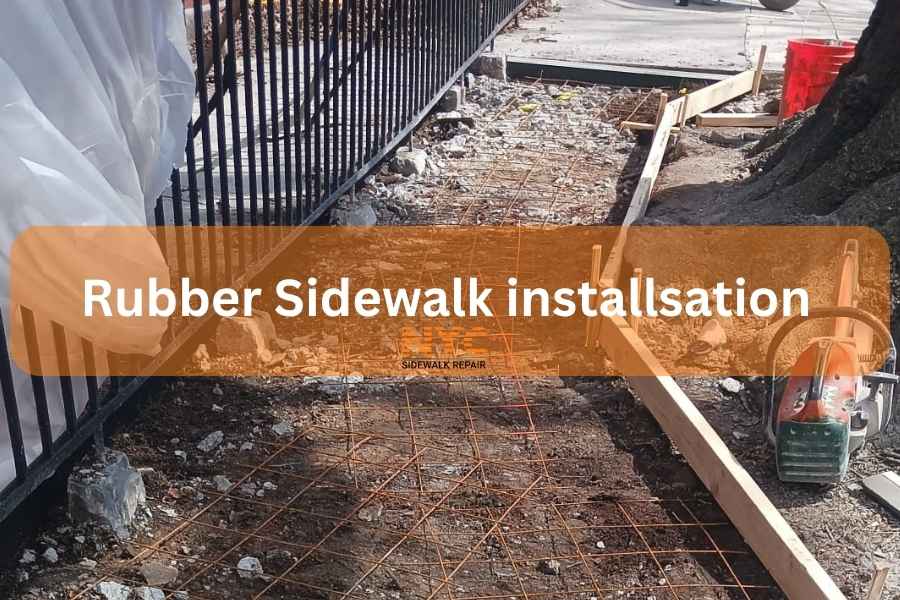5 Best Materials For Sidewalks in NYC
Choosing the right material for your sidewalk in New York City isn’t just about aesthetics, it’s about durability, safety, cost-effectiveness, and compliance with city regulations. With the city’s harsh winters, heavy pedestrian traffic, and strict regulations, selecting the best sidewalk material is essential for any property owner looking to invest wisely and maintain public safety.
This article will walk you through the five best materials for sidewalks in NYC, helping you understand their unique advantages, challenges, and costs.

Concrete
Concrete is the go-to material for sidewalks across NYC due to its strength, versatility, and relatively low cost. It typically lasts 20 to 40 years when properly installed and maintained. Concrete is highly durable under heavy foot traffic and withstands harsh winters well, especially when sealed to prevent water penetration. Maintenance generally involves cleaning and occasional sealing or crack repair.
However, concrete can crack over time due to ground movement or freeze-thaw cycles, leading to potential trip hazards. Repairing cracks can be simple and affordable, but replacing large sections is costly. Despite this, concrete’s affordability and longevity make it a top choice for NYC sidewalks, and it easily meets ADA compliance when poured to appropriate specifications.
Asphalt
Asphalt is known for its cost-effectiveness and quick installation. It is often used in less formal or temporary sidewalk areas. It offers flexibility that allows it to resist cracking better than concrete under certain ground movements. Asphalt can be resurfaced easily and economically.
However, it’s less durable in NYC’s climate, where freeze-thaw cycles cause potholes and surface deterioration faster than other materials. Asphalt sidewalks generally need more frequent repairs and resurfacing. Its smooth surface, while convenient, can become slippery when wet unless treated with additives. Asphalt is best suited for budget-conscious projects or areas with lower pedestrian volumes.

Pavers (Concrete or Stone)
Pavers are individual blocks made from concrete or natural stone that interlock to form a sidewalk. They offer great design versatility, allowing for unique patterns and colors that enhance curb appeal. Because they are modular, damaged pavers can be replaced without disturbing the entire surface, making maintenance simpler and less costly over time.
Pavers are highly durable and can handle NYC’s traffic and weather when installed on a proper base. However, installation requires skilled labor and can be more expensive upfront. Weed growth and shifting can occur if the pavers are not properly maintained, but overall they provide an excellent balance of beauty, safety, and resilience.
Natural Stone (Granite, Slate, Limestone)
Natural stone sidewalks exude premium quality and timeless elegance. Materials like granite, slate, and limestone are extremely durable, resistant to weather, and naturally slip-resistant due to their textured surfaces. These stones withstand heavy foot traffic and require minimal maintenance beyond occasional cleaning.
The downside is the higher cost for both materials and skilled installation. Also, natural stone can be uneven if not carefully installed, which may pose tripping risks or accessibility challenges. Despite these considerations, natural stone is ideal for upscale properties or historic preservation areas seeking long-lasting beauty and performance.

Rubber
Rubber sidewalks are gaining popularity in urban areas like NYC thanks to their impressive safety and sustainability features. One of the biggest advantages of rubber as a sidewalk material is its slip resistance, making it a smart choice in wet or icy conditions.
The surface is naturally water-repellent and offers excellent traction, reducing the risk of slips and falls. Even in the rare event of a fall, rubber’s shock-absorbing qualities help cushion the impact, which can be especially beneficial for seniors or children. Another major plus is its eco-friendliness.
Many rubber sidewalks are made from recycled tires or natural rubber, making them a more sustainable option with minimal environmental impact. However, rubber isn’t without its drawbacks. The design options, while available in several colors and textures, are more limited compared to concrete pavers or natural stone.
| Material | Cost (Per Sq. Ft.) | Pros | Cons |
|---|---|---|---|
| Concrete | $5-10 | Affordable, durable, customizable finish, ADA-compliant, slip-resistant | Prone to cracking, visible repairs |
| Asphalt | $3-7 | Low-cost, flexible, easy to repair | Less attractive, lower durability, regular sealing needed |
| Rubber | $8-16 | Slip-resistant, shock-absorbing, eco-friendly, low-maintenance | Limited design options, relatively high initial cost |
| Pavers | $10-30 | Stylish, customizable, easy to repair | Higher upfront cost, potential weed growth |
| Natural Stone | $15-40+ | Elegant, highly durable, weather-resistant | Expensive, slippery when wet, needs skilled installation |
Factors to Consider When Choosing the Right Sidewalk Material
Picking the right material for your sidewalk is more than just a matter of taste, it's a decision that affects your budget, property value, safety, and long-term maintenance. With so many options available, understanding the trade-offs can help you choose wisely based on your specific needs and environment. Let’s break down the key factors you should consider when selecting the best sidewalk material.
Durability
One of the first things to think about is how well the material will hold up over time. Sidewalks in New York City take a beating, from constant foot traffic to harsh winters and everything in between.
Materials like natural stone and concrete are known for their strength and can last for decades if installed properly. Pavers and rubber also offer long-term performance, especially when regularly maintained.
On the flip side, asphalt tends to crack more easily and may develop potholes, especially in areas with lots of freeze-thaw cycles, making it less durable in the long run.
Maintenance Requirements
Nobody wants a sidewalk that demands constant repairs or upkeep. Rubber surfaces are one of the lowest-maintenance options; you won't have to worry much about cracking or weeds. Concrete is fairly low-maintenance too, although it can crack over time and may require occasional sealing or patching.
Pavers and natural stones offer the benefit of replacing individual units if damage occurs, but they do require regular cleaning to prevent moss or plant growth between joints. Asphalt, while affordable, usually requires the most maintenance, especially in harsh climates like NYC’s.
Cost-Effectiveness
Budget is always a major consideration, but it’s important to think beyond just installation costs. At first glance, you can see in the above-given cost comparison table that asphalt and concrete seem like budget-friendly options. However, lower upfront costs don't always mean better value.
Rubber might appear expensive, but it pays off in reduced maintenance and a longer lifespan. Similarly, natural stone, while the priciest to install, offers unmatched longevity and a premium look that can boost property value.
Aesthetic Appeal
Let’s face it: sidewalks are part of your home or business’s first impression. If design matters to you, certain materials stand out more than others.
Concrete, pavers, and rubber offer a variety of textures, colors, and patterns, making them easy to match with different architectural styles. Natural stone, though more limited in color range, delivers a high-end, timeless look that elevates curb appeal. On the other hand, asphalt is purely functional and lacks the visual flexibility or charm of other materials.
Conclusion
Selecting the best material for your NYC sidewalk is a critical decision that affects safety, aesthetics, cost, and compliance. Concrete, asphalt, pavers, rubber, and natural stone each offer unique benefits suited to different needs and budgets. Understanding these options helps you make the most informed choice for your property.
If you’re ready to upgrade or install a sidewalk, consider consulting a licensed NYC contractor who understands local regulations and best practices. Professional guidance ensures your sidewalk is built to last, safe, and compliant.
